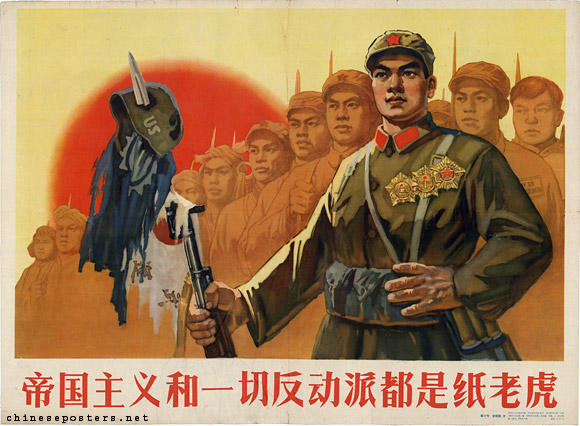More languages
More actions
بدون خلاصۀ ویرایش |
بدون خلاصۀ ویرایش |
||
| خط ۶: | خط ۶: | ||
امپریالیسم ستیزی بدین معناست که جریان های استقلال طلب و ضداستعماری را چنانچه حتی طالب [[سوسیالیسم]] نباشند حمایت کرد: | امپریالیسم ستیزی بدین معناست که جریان های استقلال طلب و ضداستعماری را چنانچه حتی طالب [[سوسیالیسم]] نباشند حمایت کرد: | ||
{{ | {{نقل قول|The struggle that the [[Amanullah Khan|Emir]] of [[Emirate of Afghanistan (1823–1926)|Afghanistan]] is waging for the independence of Afghanistan is objectively a [[revolutionary]] struggle, despite the [[monarchism|monarchist]] views of the Emir and his associates, for it weakens, disintegrates and undermines imperialism; whereas the struggle waged by such "desperate" democrats and "[[Social democracy|Socialists]]," "revolutionaries" and republicans as, for example, [[Alexander Kerensky|Kerensky]] and [[Irakli Tsereteli|Tsereteli]], [[Pierre Renaudel|Renaudel]] and [[Philipp Scheidemann|Scheidemann]], [[Viktor Chernov|Chernov]] and [[Fyodor Dan|Dan]], [[Arthur Henderson|Henderson]] and [[J. R. Clynes|Clynes]], during the imperialist war was a reactionary struggle, for its results was the embellishment, the strengthening, the victory, of imperialism. For the same reasons, the struggle that the [[Kingdom of Egypt (1922–1953)|Egyptians]] merchants and [[bourgeois]] intellectuals are waging for the independence of Egypt is objectively a revolutionary struggle, despite the bourgeois origin and bourgeois title of the leaders of Egyptian national movement, despite the fact that they are opposed to socialism.|جوزف استالین|[[Library:The foundations of Leninism|Foundations of Leninism]]|1924}} | ||
افرادی که خود را امپریالیسم ستیز مینامند اغلب اوقات مخالفت خود را بر علیه [[استعمار]]، قدرت های استعماری، [[هژمونی]] و سلطه طلبی کشور ها خارج از مرزهای از پیش تعیین شده ی خود بیان می کنند.<ref>Richard Koebner and Helmut Schmidt, ''Imperialism: The Story and Significance of a Political Word, 1840–1960'' (2010).</ref> هرچند آنها ممکن است [[کمونیست]] هم نباشند، بلکه عضوی از [[بورژوای ملی]] یا پرولتر های غیر سوسیالیست باشند. دولت های [[ایران]]، [[سوریه]] و [[روسیه]] امثال امپریالیسم ستیزی هستند که کماکان مخالف کمونیست هستند. | افرادی که خود را امپریالیسم ستیز مینامند اغلب اوقات مخالفت خود را بر علیه [[استعمار]]، قدرت های استعماری، [[هژمونی]] و سلطه طلبی کشور ها خارج از مرزهای از پیش تعیین شده ی خود بیان می کنند.<ref>Richard Koebner and Helmut Schmidt, ''Imperialism: The Story and Significance of a Political Word, 1840–1960'' (2010).</ref> هرچند آنها ممکن است [[کمونیست]] هم نباشند، بلکه عضوی از [[بورژوای ملی]] یا پرولتر های غیر سوسیالیست باشند. دولت های [[ایران]]، [[سوریه]] و [[روسیه]] امثال امپریالیسم ستیزی هستند که کماکان مخالف کمونیست هستند. | ||
نسخهٔ ۷ آوریل ۲۰۲۴، ساعت ۱۷:۲۶


دیدگاه ضد استعماری (امپریالیسم ستیزی) در مکتب مارکسیسم-لنینیسم به معنای مقاومت در برابر کشور هایی است که با توجه به چهارچوب لنین در امپریالیسم بالاترین مرحله سرمایه داری ، کشور های استعمارگر تلقی میشوند.
امپریالیسم ستیزی بدین معناست که جریان های استقلال طلب و ضداستعماری را چنانچه حتی طالب سوسیالیسم نباشند حمایت کرد:
The struggle that the Emir of Afghanistan is waging for the independence of Afghanistan is objectively a revolutionary struggle, despite the monarchist views of the Emir and his associates, for it weakens, disintegrates and undermines imperialism; whereas the struggle waged by such "desperate" democrats and "Socialists," "revolutionaries" and republicans as, for example, Kerensky and Tsereteli, Renaudel and Scheidemann, Chernov and Dan, Henderson and Clynes, during the imperialist war was a reactionary struggle, for its results was the embellishment, the strengthening, the victory, of imperialism. For the same reasons, the struggle that the Egyptians merchants and bourgeois intellectuals are waging for the independence of Egypt is objectively a revolutionary struggle, despite the bourgeois origin and bourgeois title of the leaders of Egyptian national movement, despite the fact that they are opposed to socialism.
— جوزف استالین, Foundations of Leninism, 1924
افرادی که خود را امپریالیسم ستیز مینامند اغلب اوقات مخالفت خود را بر علیه استعمار، قدرت های استعماری، هژمونی و سلطه طلبی کشور ها خارج از مرزهای از پیش تعیین شده ی خود بیان می کنند.[۱] هرچند آنها ممکن است کمونیست هم نباشند، بلکه عضوی از بورژوای ملی یا پرولتر های غیر سوسیالیست باشند. دولت های ایران، سوریه و روسیه امثال امپریالیسم ستیزی هستند که کماکان مخالف کمونیست هستند.
استفاده از این اصطلاح بعد از جنگ جهانی دوم و از ابتدا ی جنگ سرد رونق گرفت، همزمان با جریان های سیاسی در مستعمره های کشورهای اروپایی که حاکمیت ملی را رواج میدادند. برخی گروه های امپریالیسم ستیز همانند گواریسم که با آمریکا مخالف بودند، از قدرت جماهیر شوروی حمایت می کردند.
مقاله های مرتبط
منابع
- ↑ Richard Koebner and Helmut Schmidt, Imperialism: The Story and Significance of a Political Word, 1840–1960 (2010).
